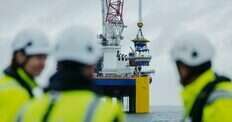- Thor offshore wind farm's 72 foundations and substation are installed, with turbine installation starting in spring 2026.
- The project features CO2-reduced steel towers and recyclable blades, aiming for completion in 2027.
- Thor will generate enough electricity to power over one million Danish homes.
- RWE and Norges Bank Investment Management are the main stakeholders, with RWE handling construction and operations.

Project Overview
The 1.1-gigawatt Thor offshore wind farm, located in the Danish North Sea, has completed its foundation installation. This includes 72 monopiles and secondary steel structures, with turbine installation set to begin in spring 2026.
Sustainability Features
Thor will be the first offshore wind farm to use 36 steel turbine towers with a reduced carbon footprint. Additionally, some turbines will feature recyclable rotor blades, contributing to the project's sustainability goals.
Timeline and Capacity
Scheduled for completion in 2027, the Thor wind farm will generate enough green electricity to power over one million Danish households. The turbine installation will be conducted from the Port of Esbjerg, Denmark.
Local Impact and Operations
The operations and maintenance plan includes creating 50 to 60 local jobs at a new RWE service building at the Port of Thorsminde, expected to be completed by early 2026. RWE is responsible for the construction and operations of the wind farm, in partnership with Norges Bank Investment Management.

